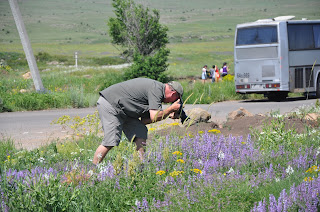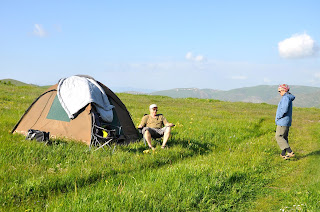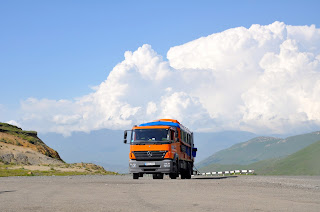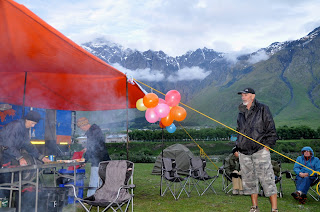Towards OnePlanet2020
Well, I know you are wondering why I've called this blog site OnePlanet2020. Well, this is Blog is about two journeys. The first is the journey we are undertaking overland from Istanbul to Beijing - yes the old Silk Road route (or one of them anyway). No camels this time, just a big truck called Penelope, as seen on the first post with our team of travellers!
The second journey is an equally interesting one. Its move work on how we can achieve global sustainability on planet Earth. As many of you will be aware, my first book was published on this subject in 2012 entitled Plan for the Planet: A business plan for a sustainable world.
The journey from Istanbul to Beijing provides the much needed time to work on the follow up to this book working tittle being Turning the Planet Around, which will be about how we put the plan outlined in Plan for the Planet into action.
Why do this, I hear you ask, when you could be sitting back, putting your feet up, and just having a holiday? The first answer is simple. When writing the first book, my thoughts were that when it was published, the approach outlined, that of putting a plan in place to transition our planet from the rather precarious position we are currently in, to a more sustainable one, would be picked up by others, developed further and we would be well on the way.
That however, has not happened. The rather simple concepts outlined in Plan for the Planet, that of using our best practice global management practices to successfully manage our progression from our current situation to a more viable long term future for us and our kids. Our current situation? I like to liken our current situation to us moving rapidly to a Mad Max scenario, driven by diminishing resources of energy, food, water and increasing demand of an exponentially growing global population and our obsession with continuing growth.
Well you don't have to be a rocket scientist to work out that this equation is going to at some stage come to a rather abrupt halt. The point where our resources, such as energy fail to meet the demands of our increasing population. At this stage, we will have to readjust - and this will either be an abrupt adjustment - where we suddenly start arguing on a global scale about who gets the resources, which as we saw in the last century usually ends in tears - as the global world wars demonstrated.
Or we will realise, that this is a smarter way we can tackily this issue, and that by working cooperatively on solutions, rather than conflict, we can discover the answers to most of the major challenges we are facing on the planet - population, energy, climate change, food and water, destruction of our environment, poverty, global education, global conflict and how we are going to finance it all?
Sound like a pipe dream? Well there are two reasons why it isn't. The first is that it is something we have to achieve - if we want a viable future. A mad Max scenario is not something I have heard any one say they see as a desirable future. Yet as I see it, we currently have an 80% chance of hitting exactly that scenario based on the ways we are currently approaching things. Therefore, we need to find a better way of doing things. The good news I discovered when writing Plan for the Planet, is that we already know how to do it. If I ask people how well are we managing the planet a the moment, most people say they think we could be managing it better. If I then ask whether we have the global management capabilities to achieve this - the answer is again yes, in fact we actually did this as we rebuilt our global civilisation after the Second World War, with the Marshall Plan. Since then, we have continued to refine these global management skills through the application to global corporations - with great success to those global corporations. Look at Apple, Google, Microsoft, Sony to name a few.
Are we applying those great management skills to our global situation. Again, most people I speak to say we could be doing a much better job of this.
So we have the understanding, which was outlined in Plan for the Planet, we have the capabilities, what we need is the application and implementation. That is the challenge I want to explore in Turning the Planet Around. The journey to building a sustainable world. I'd love you to join in on these two journeys, share the sites as we travel between Istanbul to Beijing, the journey between task and west, between our past and our future, between our old civilisations, and our new.
Equally I'd like to share with you then insights this trip reveals, on how we can achieve a sustainable world, before the Mad Max scenario sets in. I'd love you to share your insights, comments, likes dislikes, so we can make this journey as much fun as we can. My sense is we are on the brink of the most exciting revolution of our time, the sustainability revolution, the revolution that will create a world we can be proud to had to our children - a future we are not in a position to guarantee at the moment.
From the work I have being doing on global sustainability over the last 8 years, 80% chance of hitting the Mad Max scenario is currently the most likely outcome? However, by focusing on strengthening the 20% chance of hitting a more favourable outcome, was can change the odds in our favour.
Oh yes? What was the second reason for embarking on this journey? We'll I'll have some time on my hands as we travel, so what better way of using the time! And why OnePlanet2020? The answer is simple. I believe we have to have in place, and implemented our strategy for global sustainability by 2020. Get this happening, and we've change the odds from our 80% downside scenario. So thats the goal, and this journey is one to be shared, as none of us can achieve this on our own. That is what his blog is about - a journey literally down the old Silk Road, to the new world of global sustainability. So it will be a part travelogue, part insights from the journey to Beijing, and to sustainability, and part just experiencing the enjoyment of this journey. Welcome aboard!

















































